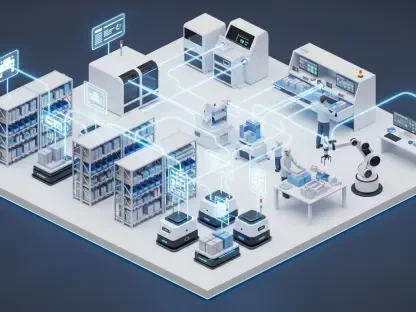The transportation sector is witnessing a wave of digital transformation, with vehicle rental businesses at the forefront. The advent of innovative digital tools is revamping fleet management, leading to enhanced efficiency and superior customer experiences. This article explores how digitization is reshaping operations in the rental industry.
Digital Revolution in Fleet Management
Centralization and Automation
The shift from manual to automated systems is pivotal. Digital software centralizes operations, eliminating paper-based processes rife with delays and errors. This transformation involves integrating various department functions into a single, cohesive platform, ensuring real-time tracking of vehicle availability, repairs, and revenue streams. Miscommunications and downtime, which were common in traditional systems, are significantly reduced through such consolidation.
Automation ensures standardized operations, where digital checklists enable consistent vehicle inspections, reducing miscommunications and disputes. By employing automated workflows, companies are able to maintain adherence to safety standards, thus enhancing overall efficiency. Digital checklists and reporting tools replace physical forms, allowing for instant updates and accessible records. This shift not only reduces human error but also speeds up processes that were traditionally bogged down by manual input. Furthermore, the standardization introduced by automation paves the way for a more transparent and accountable operational structure.
Data-Driven Insights
Data analytics are vital in this digital transition. Modern systems collect and analyze data, identifying trends such as high-performing vehicles and peak rental times. These insights enable companies to make informed decisions regarding inventory management, staff scheduling, and pricing strategies. By leveraging data analytics, vehicle rental businesses can optimize their resources to match fluctuating demand, ensuring that they are prepared for both peak seasons and slower periods.
Businesses can also forecast and optimize resources to meet seasonal demands, boosting efficiency and profitability. Predictive analytics tools allow companies to anticipate future trends based on historical data, providing a competitive edge in the market. By understanding usage patterns and customer preferences, rental businesses can tailor their services to better meet client expectations. This level of customization not only improves customer satisfaction but also enhances operational efficiency. Overall, data-driven insights play a crucial role in driving strategic planning and continuous improvement.
Enhancing Customer Experience
Digital-First Interactions
Today’s digitally-savvy customers demand seamless experiences. Car rental software facilitates online bookings, mobile reservations, and instant confirmations, making rentals convenient and attractive. By integrating user-friendly interfaces and streamlined processes, digital platforms cater to the preferences of modern customers. This transition reduces the need for in-person interactions, expediting the rental process and aligning with the growing consumer expectation for convenience and speed.
This shift caters to the modern customer’s expectation for quick, digital-first interactions. The ability to book, modify, or cancel reservations through various digital channels provides a level of flexibility that traditional methods could not match. Such platforms also offer additional features, such as real-time vehicle tracking and contactless rental options, further enhancing the user experience. As a result, businesses that adopt these tools can attract and retain a broader customer base, gaining a competitive edge in a market driven by convenience and technology.
Transparency and Efficiency
Efficiency and customer trust are boosted through digital contracts, electronic signatures, and automated notifications. These tools streamline the rental process, providing clarity and encouraging repeat business. The transparency afforded by digital systems allows customers to view all necessary information regarding their rental agreement, including terms and conditions, rates, and vehicle status. This level of openness builds trust and fosters long-term customer relationships.
Automated return reminders and real-time updates enhance overall customer satisfaction. Customers receive timely notifications about important milestones, such as approaching return dates or maintenance schedules, ensuring that they remain informed throughout the rental period. This proactive communication not only reduces the likelihood of late returns and associated penalties but also enhances the overall customer experience. By prioritizing transparency and efficiency, rental businesses can cultivate a loyal customer base and generate positive word-of-mouth referrals.
Cost Reduction and Future Preparedness
Operational Efficiency and Maintenance
Labor and operational costs decrease with automation handling billing, scheduling, and damage reports. By digitizing these processes, businesses can significantly cut down on labor costs and reduce the margin for human error. Automated billing systems ensure that invoices are generated accurately and in a timely manner, reducing administrative burdens and improving cash flow. Additionally, digital scheduling tools facilitate better resource allocation by optimizing fleet availability, thus maximizing revenue potential.
Digital reminders ensure timely maintenance, extending vehicle lifespans and preventing breakdowns. This proactive approach to vehicle care leads to significant cost savings. Scheduled maintenance notifications help avoid costly repairs that stem from neglected servicing. By keeping vehicles in peak condition, businesses can also enhance the customer experience by reducing the incidence of breakdowns and other issues that could disrupt the rental process. Moreover, well-maintained vehicles often fetch higher resale values, providing an additional financial benefit.
Adaptability and Competitive Edge
The transportation sector is undergoing a significant digital transformation, particularly evident in vehicle rental services. The introduction of cutting-edge digital tools is reimagining fleet management, boosting efficiency and elevating customer satisfaction. This digital shift is not just a trend but a profound change in how rental businesses operate. From streamlining reservations to real-time vehicle tracking, every aspect of the rental process is becoming more seamless and user-friendly. Advanced analytics are enabling better decision-making, predicting customer needs, and optimizing fleet usage. This innovative wave of digitization ensures that rental companies can offer faster, more reliable services, while also reducing operational costs and vehicle downtime. This transformation is leading the vehicle rental market into a new era of efficiency and customer-centric service. This article delves into the ways digitization is revolutionizing operations in the rental industry, creating a more dynamic and responsive environment.









